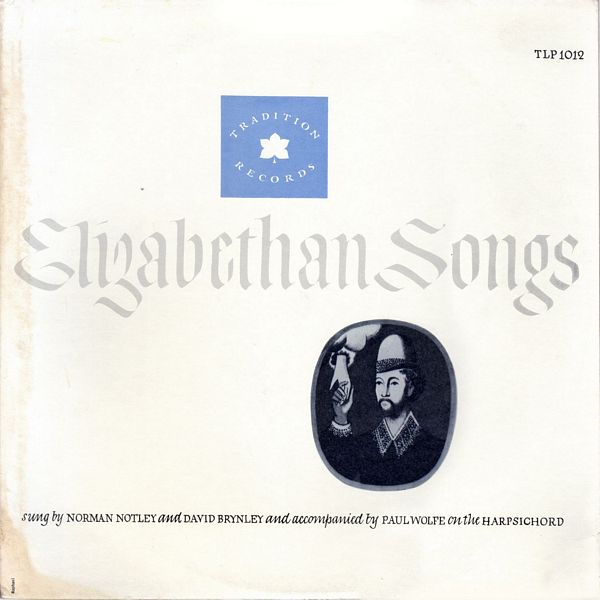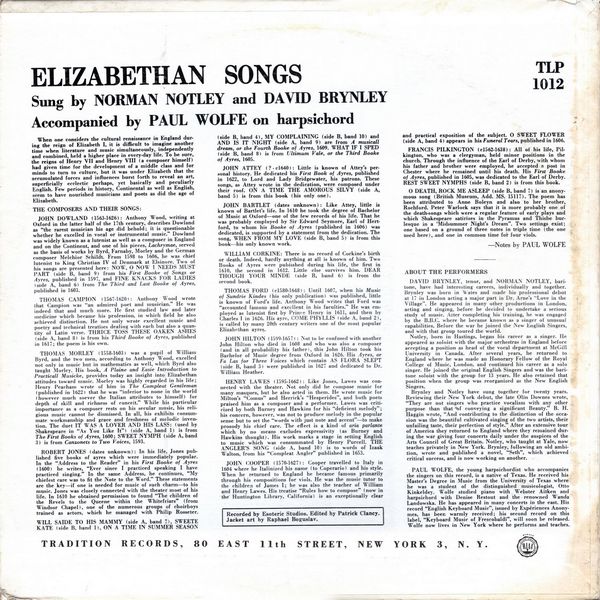

 |

|
Sleeve Notes
ELIZABETHAN SONGS
When one considers the cultural renaissance in England during the reign of Elizabeth I, it is difficult to imagine another time when literature and music simultaneously, independently and combined, held a higher place in every-day life. To be sure, the reigns of Henry VII and Henry VIII (a composer himself) had given time for the development of a middle class and for minds to turn to culture, but it was under Elizabeth that the accumulated forces and influences burst forth to reveal an art, superficially ecclectic perhaps, yet basically and peculiarly English. Few periods in history, Continental as well as English, seem to have nourished musicians and poets as did the age of Elizabeth.
THE COMPOSERS AND THEIR SONGS:
JOHN DOWLAND (1563-1626): Anthony Wood, writing at Oxford in the latter half of the 17th century, describes Dowland as "the rarest musician his age did behold; it is questionable whether he excelled in vocal or instrumental music." Dowland was widely known as a lutenist as well as a composer in England and on the Continent, and one of his pieces, Lachrymae, served as the basis of works by Byrd, Farnaby, Morley and the German composer Melchior Schildt. From 1598 to 1606, he was chief lutenist to King Christian IV of Denmark at Elsinore. Two of his songs are presented here: NOW, O NOW I NEEDS MUST PART (side B, band 9) from his First Booke of Songs or Ayres, published in 1597, and FINE KNACKS FOR LADIES (side A, band 6) from The Third and Last Booke of Ayres, published in 1603.
THOMAS CAMPION (1567-1620): Anthony Wood wrote that Campion was "an admired poet and musician." He was indeed that and much more. He first studied law and later medicine which became his profession, in which field he also achieved distinction. He not only wrote excellent music and poetry and technical treatises dealing with each but also a quantity of Latin verse. THRICE TOSS THESE OAKEN ASHES (side A, band 8) is from his Third Booke of Ayres, published in 1617; the poem is his own.
THOMAS MORLEY (1558-1603) was a pupil of William Byrd, and the two men, according to Anthony Wood, excelled not only in music but in mathematics as well, which Byrd also taught Morley. His book, A Plaine and Easie Introduction to Practicall Musicke, provides today an insight into Elizabethan attitudes toward music. Morley was highly regarded in his life; Henry Peachain wrote of him in The Compleat Gentleman (published in 1622) that he was "inferior to none in the world (however much soever the Italian attributes to himself) for depth of skill and richness of conceit." While his particular importance as a composer rests on his secular music, his religious music cannot be dismissed. In all, his exhibits consummate workmanship and grace and freshness of melodic invention. The duet IT WAS A LOVER AND HIS LASS: (used by Shakespeare in "As You Like It", side A, band 1) is from The First Books of Ayres, 1600; SWEET NYMPH (side A, band 3) is from Canzonezs to Two Voices, 1593.
ROBERT JONES (dates unknown): In his life, Jones published five books of ayres which were immediately popular. In the "Address to the Reader" in his First Booke of Ayres (1600) he writes, "Ever since I practiced speaking I have practiced singing." In the same Address, he continues, "My chiefest care was to fit the Note to the Word." These statements are the key — if one is needed for music of such charm — to his music. Jones was closely connected with the theater most of his life. In 1610 he obtained permission to found "The children of the Revels to the Queene within the Whitefriars" (from Windsor Chapel), one of the numerous groups of choirboys trained as actors, which he managed with Philip Rosseter.
WILL SAIDE TO HIS MAMMY (side A, band 7), SWEETE KATE (side B, hand 1), ON A TIME IN SUMMER SEASON(side B, hand 4), MY COMPLAINING (side B, hand 10) and AND IS IT NIGHT (side A, band 9) are from A musicall dream, or the Fourth Booke of Ayres, 1609. WHAT IF I SPED (side B, band 8) is from Ultimum Vale, or the Third Booke of Ayres, 1605.
JOHN ATTEY (?-c1640) Little is known of Attey's personal history. He dedicated his First Book of Ayres, published in 1622, to Lord and Lady Bridgewater, his patrons. These songs, as Attey wrote in the dedication, were composed under their roof. ON A TIME THE AMOROUS SILVY (side A, band 5) is from this book (his only one).
JOHN BARTLET (dates unknown): Like Attey, little is known of Bartlet's life. In 1610 he took the degree of Bachelor of Music at Oxford — one of the few records of his life. That he was probably employed by Sir Edward Seymore, Earl of Hertford, to whom his Booke of Ayres (published in 1606) was dedicated, is supported by a statement from the dedication. The song, WHEN FROM MY LOVE (side B, band 5) is from this book — his only known work.
WILLIAM CORKINE: There is no record of Corkine's birth or death. Indeed, hardly anything at all is known of him. Two Books of Ayres were published during his life, the first in 1610, the second in 1612. Little else survives him. DEAR TROUGH YOUR MINDE (side B, band 6) is from the second book.
THOMAS FORD (c1580-1648) Until 1607, when his Musk of Sundrie Kindes (his only publication) was published, little is known of Ford's life. Anthony Wood writes that Ford was "accounted famous and excellent in his faculties." He was employed as lutenist first by Prince Henry in 1611, and then by Charles J in 1626. His ayre, COME PHYLLIS (side A, hand 2), is called by many 20th century writers one of the most popular Elizabethan ayre.
JOHN HILTON (1599-1657): Not to he confused with another John Hilton who died in 1608 and who was also a composer (and in all probability his father), this John Hilton took his Bachelor of Music degree from Oxford in 1626. His Ayres, or Fa Las for Three Voices which contain AS FLORA SLEPT (side B, hand 3) were published in 1627 and dedicated to Dr. William Heather.
HENRY LAWES (1595.1662): Like Jones, Lawes was connected with the theater. Not only did he compose music for many masques, but he also acted in them. He wrote music for Milton's "Comus" and Hlerriek's "Hesperides", and both poets praised him as a composer and a performer. Lawes was criticized by both Burney and Hawkins for his "deficient melody"; his concern, however, was not to produce taelody in the popular sense but to set the "words with Just note and accent" — to make prosody his chief care. The effect is a kind of aria parlante which by no means excludes expressivity (as Burney and Hawkins thought). His work marks a stage in setting English to music which was consummated by Henry Purcell. THE ANGLER'S SONG (side A, band 10) is to words of Izaak Walton, from his "Compleat Angler" published in 1653.
JOHN COOPER (1570-1627): Cooper travelled to Italy in 1604 where he Italinized his name (to Coperario) and his style. When he returned to England he became famous primarily through his compositions for viols. He was the music tutor to (he children of James I; he was also the teacher of William and Henry Lawes. His treatise "Rules how to compose" (now in the Huntington Library, California is an exceptionally clear and practical exposition of the subject. 0 SWEET FLOWER (side A, band 4) appears in his Funeral Tears, published in 1606.
FRANCIS PILKINGTON (c1562-1638): All of his life, Pilkington, who was a clergyman, held minor position in the church. Through the influence of the Earl of Derby, with whom his father and brother were employed, he accepted a post in Chester where he remained until his death. His Fins Booke of Ayres, published in 1605, was dedicated to die Earl of Derby. REST SWEET NYMPHS (side B, band 2) is from this hook.
O DEATH, ROCK ME ASLEEP (side B, band 7) is an anonymous song (British Museum, Add. MS. 15117). The poem has been attributed to Anne Boleyn and also to her brother, Rochford. Peter Warlock says that it is more probably one of the death-songs which were a regular feature of early plays and which Shakespeare satirizes in the Pyramus and Thisbe burlesque in a 'Midsummer Night's Dream". Two settings exist; one based on a ground of three notes in triple time (the one used here), and one in common time for four viols.
— Notes by PAUL WOLFE
ABOUT THE PERFORMERS
DAVID BRYNLEY, tenor, and NORMAN NOTLEY, baritone, have had interesting careers, individually and together. Brynley was born in Wales and made his professional debut at 17 in London acting a major part in Dr. Arne's Love in the Village". He appeared in many other productions in London, acting and singing, before he decided to undertake a serious study of music. After completing his training, he was engaged by the B.B.C. where he became known as a singer of unusual capabilities. Before the war he joined the New English Singers, and with that group toured the world.
Notley, born in Hastings, began his career as a singer. He appeared as soloist with the major orchestras in England before accepting a position as head of the vocal department at McGill University in Canada. After several years, he returned to England where he was made an Honorary Fellow of the Royal College of Music, London, and continued his career as a solo singer. He joined the original English Singers and was the baritone soloist with the group for 13 years. He also retained that position when the group was reorganized as the New English Singers.
Brynley and Notley have sung together for twenty years. Reviewing their New York debut, the late Olin Downes wrote, "They are not singers who practice vocalism with any other purpose than that of conveying a significant Beauty." B. H. Haggin wrote, "And contributing to the distinction of the occasion was the beautiful cultivated singing of the two artists, their unfailing taste, their perfection of style." After an extensive tour of America they returned to England where they remained during the war giving four concerts daily under the auspices of the Arts Council of Great Britain. Notley, who taught at Yale, now teaches privately in New York. Brynley, following an old ambition, wrote and published a novel, "Seth", which achieved critical success, and is now working on another.
PAUL WOLFE, the young harpsichordist who accompanies the singers on this record, is a native of Texas. He received his Master's Degree in Music from the University of Texas where he was a student of the distinguished musicologist, Otto Kinkeldey. Wolfe studied piano with Webster Aitken and harpsichord with Denise Restout and the renowned Wanda Landowska. He has appeared in many concerts in the east. His record "English Keyboard Music", issued by Experiences Anonymes, has been warmly received; his second record on this label, "Keyboard Music of Freseobaldi", will soon he released. Wolfe now lives in New York where he performs and teaches.